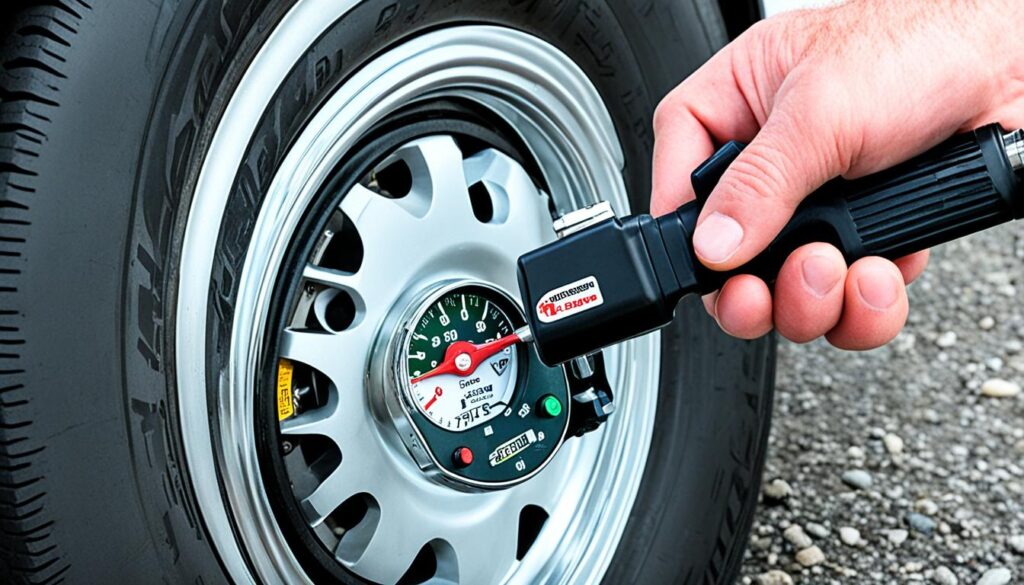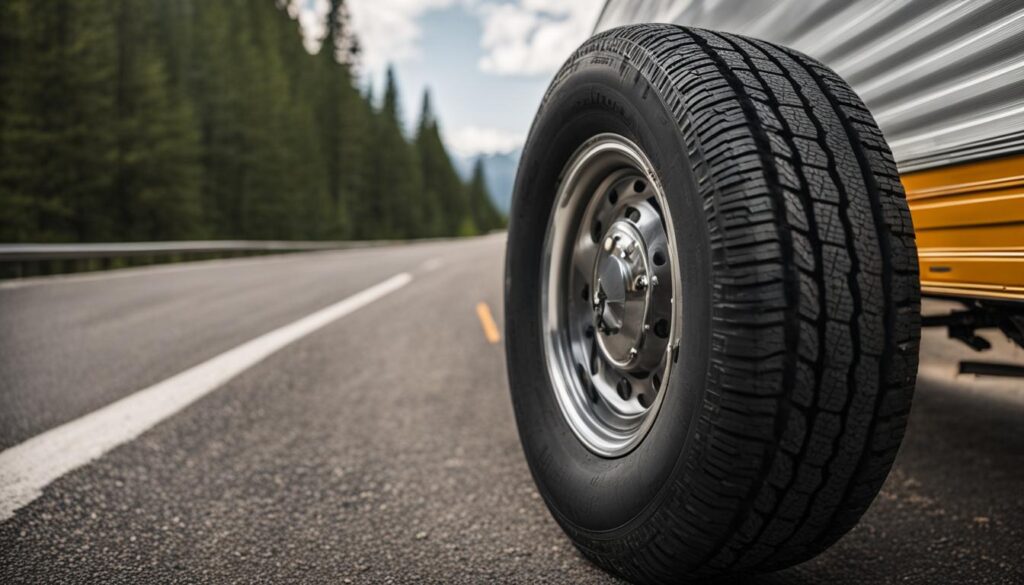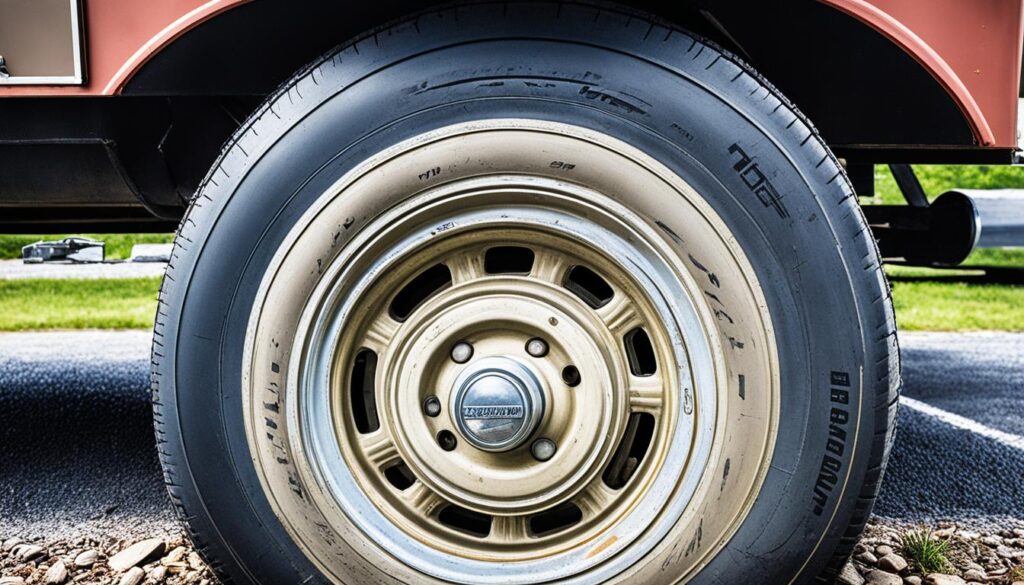As an RV enthusiast, have you ever wondered how long your travel trailer tires can last? Do you believe that mileage is the only factor determining the lifespan of these essential components? Or are there other factors at play that you might not have considered?
In this guide, I will provide you with insights into the average lifespan of travel trailer tires and the factors that can influence their durability. We will explore how proper maintenance and care can extend the life of your tires, as well as the signs that indicate it’s time for a replacement. Let’s dive in and uncover the truth about travel trailer tire longevity.
Key Takeaways:
- The average lifespan of travel trailer tires is around 5 years, based on age rather than wear.
- Factors such as tire quality, driving conditions, weight distribution, and tire maintenance can affect tire lifespan.
- Regularly inspect your tires for signs of wear and tear, such as cracks, bulges, uneven wear, and low tread depth.
- Proper tire maintenance and care, including maintaining correct tire pressure, can help extend their lifespan.
- Tire replacement should be based on age, condition, and manufacturer recommendations, rather than solely on mileage.
Contents
Factors Affecting Travel Trailer Tire Lifespan
When it comes to the lifespan of travel trailer tires, several factors play a role in determining how long they will last. From tire quality to driving conditions and maintenance practices, understanding these factors can help RV enthusiasts maximize the longevity of their tires and ensure safer travels.
Tire Quality
The quality of the tire itself is one of the most significant factors affecting its lifespan. High-quality tires are designed to withstand the unique demands of RV travel, offering greater durability and longevity compared to low-quality ones. Investing in tires from reputable brands known for their quality and performance can greatly extend the lifespan of travel trailer tires.
Driving Conditions
The conditions in which you drive your travel trailer can also impact tire lifespan. Rough roads, extreme temperatures, and frequent encounters with potholes or debris can result in quicker tire wear. It’s important to consider the road conditions you typically encounter and adjust your driving habits accordingly to minimize unnecessary strain on the tires.
Weight Distribution
Proper weight distribution is crucial for maintaining the health of travel trailer tires. Overloaded tires can lead to excessive wear and can compromise tire safety. Ensuring that weight is evenly distributed across all tires and not exceeding their maximum weight capacity will help prevent premature wear and potential tire failure.
Tire Pressure
Maintaining the correct tire pressure is essential for extending the lifespan of travel trailer tires. Underinflated or overinflated tires can cause uneven wear, reduced fuel efficiency, and increased risk of tire failure. Regularly check and maintain the recommended tire pressure to maximize tire lifespan and ensure optimal performance on the road.
Environmental Factors
Environmental factors such as exposure to UV rays and moisture can contribute to tire aging and deterioration. RV owners should take precautions to protect their tires from excessive sunlight and moisture by using tire covers when the trailer is parked and storing the tires in a cool, dry environment when not in use.
By considering these factors and following proper maintenance practices, RV enthusiasts can maximize the lifespan of their travel trailer tires, ensuring safer travels and reducing the need for frequent replacements.
Signs of Worn Out Travel Trailer Tires
Regularly inspecting travel trailer tires is essential to ensure safe and smooth RV travels. By keeping an eye out for certain signs of wear and tear, you can detect potential issues early on and prevent tire blowouts on the road.
Here are some common signs of worn out travel trailer tires:
- Cracks: Check the sidewall and treads for cracks, as they indicate tire aging and potential failure.
- Bulges or Bubbles: Any bulges or bubbles on the sidewall are signs of internal damage and must be addressed immediately to prevent tire failure.
- Uneven Wear: Inspect the tire surface for uneven wear patterns, which can indicate improper weight distribution or misalignment.
- Tread Depth: Measure the tread depth and ensure it is above the recommended threshold. If it falls below 4/32 of an inch, it’s time to replace the tires as they no longer provide adequate traction.
Regularly checking for these signs can help you identify worn out travel trailer tires and take appropriate action to ensure your safety on the road. Remember, proactive tire maintenance is crucial for a smooth and worry-free RV journey.
Quote:
“Inspecting your travel trailer tires for signs of wear and tear is an important part of RV maintenance. By identifying and addressing any issues early on, you can ensure a safe and enjoyable travel experience.”
Maintenance Tips for Travel Trailer Tires
Proper maintenance is essential for maximizing the lifespan of travel trailer tires. By following these maintenance tips, you can extend the life of your tires and ensure a safer and smoother RV experience.
- Regularly Check and Maintain Tire Pressure: It is crucial to check the tire pressure regularly and maintain it according to the manufacturer’s recommendations. Adequate tire pressure helps optimize tire performance and prevents premature wear and damage.
- Inspect for Signs of Wear and Damage: Before each trip, thoroughly inspect your travel trailer tires for any signs of wear, cracks, bulges, or punctures. Promptly address any issues to avoid potential tire failure on the road.
- Rotate Tires Periodically: Rotate your travel trailer tires regularly to promote even wear. This helps extend the overall lifespan of the tires and ensures better traction and stability while driving.
- Keep Tires Clean: Wash your travel trailer tires regularly to remove dirt, grime, and road debris. Keeping the tires clean helps prevent buildup, which can lead to accelerated wear and decreased performance.
- Protect Tires from UV Rays: When parked for extended periods, use tire covers to shield your travel trailer tires from harmful UV rays. UV exposure can cause tire degradation and reduce their lifespan.
- Avoid Parking on Wet or Uneven Surfaces: Parking your RV on wet or uneven surfaces can lead to moisture damage and uneven tire wear. Whenever possible, park on dry, level ground to protect your tires.
- Store Unused Tires Properly: If you have spare tires or need to store your travel trailer tires, ensure they are stored in a cool, dry environment away from direct sunlight and air currents. This helps prevent premature aging and deterioration.
By implementing these maintenance tips, you can significantly increase the lifespan of your travel trailer tires and enjoy safer and more reliable journeys on the road.

When to Replace Travel Trailer Tires
Knowing when to replace travel trailer tires is crucial for ensuring the safety and performance of your RV. Rather than solely focusing on mileage, it is recommended to replace travel trailer tires every 5 to 6 years. This is because tires deteriorate over time due to various factors.
Exposure to UV rays, moisture, and chemical changes in the rubber can all contribute to tire aging and degradation. Regardless of the amount of use, old tires can become more prone to failures and blowouts, jeopardizing the safety of your travels.
Regular inspections are essential in determining when it’s time to replace your travel trailer tires. Look out for signs of wear, damage, or tread depth below the recommended threshold. If you notice cracks, bulges, uneven wear, or tire treads that are worn out, it’s a clear indication that replacement is necessary.
By staying vigilant and proactive in monitoring the condition of your travel trailer tires, you can prioritize safety on the road and prevent potential accidents. Remember, safety should always be the top priority when it comes to your RV adventures.
| Signs it’s time to replace travel trailer tires |
|---|
| Cracks on the sidewall or between treads |
| Bulges or bubbles on the sidewall |
| Uneven wear on the tire surface |
| Tread depth below the recommended threshold (4/32 of an inch) |
Tips for Tire Safety and Performance
To ensure tire safety and optimal performance for your RV, it’s important to follow these tire safety tips and practices:
- Maintain proper tire pressure: Regularly check and maintain the correct tire pressure according to the manufacturer’s recommendations. Proper inflation helps improve fuel efficiency, handling, and tire longevity.
- Keep the tires balanced and aligned: Ensure that your RV’s tires are balanced and properly aligned. Imbalanced or misaligned tires can cause uneven wear, leading to decreased performance and potential safety issues.
- Properly distribute the weight: When loading your RV, distribute the weight evenly to avoid overloading individual tires. Uneven weight distribution can put excessive stress on certain tires, leading to premature wear and potential tire failure.
- Avoid excessive speeds: Adhere to the speed rating specified by the tire manufacturer. Driving at excessive speeds can generate excessive heat, compromising tire safety and performance.
- Avoid abrupt braking and acceleration: Sudden and aggressive braking or acceleration can put stress on the tires and increase the risk of tire damage or failure. Practice gradual and smooth maneuvers to protect the tires.
- Avoid parking near sharp objects or debris: When parking your RV, be cautious of sharp objects or debris that can puncture or damage the tires. Park in designated safe areas to minimize the risk of tire-related incidents.
- Follow manufacturer’s recommendations: Always refer to the manufacturer’s guidelines for tire care and maintenance. This includes recommended tire rotation intervals, inspections, and any specific recommendations for your RV’s tire model.
By implementing these tire safety tips, you can enhance the safety and performance of your RV tires. Proper tire maintenance is vital for a smooth and secure road-tripping experience.

Tire Types for RVs
When it comes to RV tires, there are two main types that are commonly used: Special Trailer (ST) tires and Light Truck (LT) tires. Each type is designed to serve different purposes and cater to specific RV needs. Let’s take a closer look at these tire types and their characteristics.
Special Trailer (ST) Tires
ST tires are specifically designed for trailer usage, making them an ideal choice for travel trailers. These tires feature a stronger sidewall construction to handle the additional weight and stress of towing. Their durable construction helps minimize sway and provide better stability on the road. ST tires are also equipped with special compounds that resist UV rays and aging, ensuring longevity. With a maximum speed rating of 65 mph, ST tires are suited for a wide range of RV travel needs.
Light Truck (LT) Tires
LT tires are designed to handle the weight and demands of heavier RVs such as class A, B, and C motorhomes. These tires are constructed with reinforced sidewalls, which offer enhanced load-carrying capacity and improved performance. LT tires come in a variety of tread patterns that provide excellent traction on different road surfaces and in various weather conditions. Their versatility makes them suitable for RV owners who prioritize durability and want a tire that can handle rugged terrains and challenging driving conditions.
Choosing the right tire type for your RV depends on several factors, including the specific RV model, weight capacity, driving conditions, and speed requirements. It is essential to consult the RV manufacturer’s recommendations and consider these factors when making your decision. Opting for the appropriate tire type ensures optimal performance and safety during your RV adventures.
| Tire Type | Application | Sidewall Construction | Speed Rating | Tread Patterns |
|---|---|---|---|---|
| ST Tires | Trailers and Travel Trailers | Strong Sidewall | Up to 65 mph | Standard Tread Patterns |
| LT Tires | Class A, B, and C Motorhomes | Reinforced Sidewall | Varies by Tire Model | Wide Range of Tread Patterns |
Tire Storage Tips
Properly storing tires when not in use is crucial to their longevity. As an RV owner, here are some tire storage tips that you should keep in mind:
1. Ensure the RV is level and inflate the tires to the recommended pressure. This helps prevent flat spots and maintains proper tire shape during storage.
2. Use tire blocks or treated lumber to support and protect the tires from the ground surface. This helps prevent moisture damage and avoids tire deformation.
3. Cover the tires with tire covers to shield them from UV rays and prevent premature aging. UV rays can cause the rubber to deteriorate over time, so it’s essential to protect the tires from direct sunlight exposure.
Following these tire storage tips will help protect the tires from environmental damage and maintain their condition during periods of non-use. Additionally, before using the RV again after storage, it’s important to conduct regular inspections and proper maintenance to ensure the tires are in optimal condition.
FAQ
How long do travel trailer tires last?
On average, RV owners can expect to get at least 30,000 miles out of their travel trailer tires. However, it is important to note that most RVs are not driven extensively, so tire replacement is often based on age rather than wear. In general, it is recommended to replace travel trailer tires at or before the 5-year mark.
What factors affect the lifespan of travel trailer tires?
The lifespan of travel trailer tires can be affected by various factors, including the quality of the tire, driving conditions, weight distribution, tire pressure, and environmental factors. High-quality tires tend to last longer than low-quality ones. Driving conditions such as rough roads or extreme temperatures can impact tire lifespan. Proper weight distribution and tire pressure maintenance are crucial. Environmental factors like UV exposure and moisture can also contribute to tire aging.
What are the signs of worn out travel trailer tires?
Signs of worn out travel trailer tires include cracks, bulges, uneven wear, and tread depth below the recommended threshold. Cracks on the sidewall or between the treads can indicate tire aging. Bulges or bubbles on the sidewall are signs of internal damage. Uneven wear can be an indicator of improper weight distribution or misalignment. Tread depth below 4/32 of an inch means it’s time to replace the tires.
What are some maintenance tips for travel trailer tires?
Some maintenance tips for travel trailer tires include regularly checking and maintaining the correct tire pressure, inspecting the tires for signs of wear and damage before each trip, rotating the tires periodically, keeping the tires clean, using tire covers to protect them, and avoiding parking on wet or uneven surfaces. Storing unused tires in a cool, dry environment is also recommended.
When should travel trailer tires be replaced?
Travel trailer tires should be replaced at or before the 5-year mark based on age and condition, rather than solely on mileage. If the tires show signs of wear, damage, or have tread depth below the recommended threshold, they should be replaced promptly.
What are some tips for tire safety and performance?
To ensure tire safety and optimal performance, RV owners should maintain proper tire pressure, balance and align the tires, properly distribute the weight inside the RV, avoid excessive speeds and abrupt braking or acceleration, avoid parking near sharp objects or debris, and follow the manufacturer’s recommendations for tire care and maintenance.
What are the types of tires for RVs?
There are two main types of tires used for RVs: ST (Special Trailer) tires and LT (Light Truck) tires. ST tires are specifically designed for trailer usage and have a stronger sidewall to handle the additional weight. LT tires are designed for larger RVs like class A, B, and C motorhomes and are made to withstand the weight and demands of these vehicles.
What are some tire storage tips for RV owners?
When storing tires, RV owners should ensure the RV is level, inflate the tires to the recommended pressure, use tire blocks or treated lumber to support and protect the tires from the ground surface, and cover the tires with tire covers to shield them from UV rays and prevent premature aging. Regular inspections and proper maintenance should also be conducted when preparing the RV for use again after storage.






